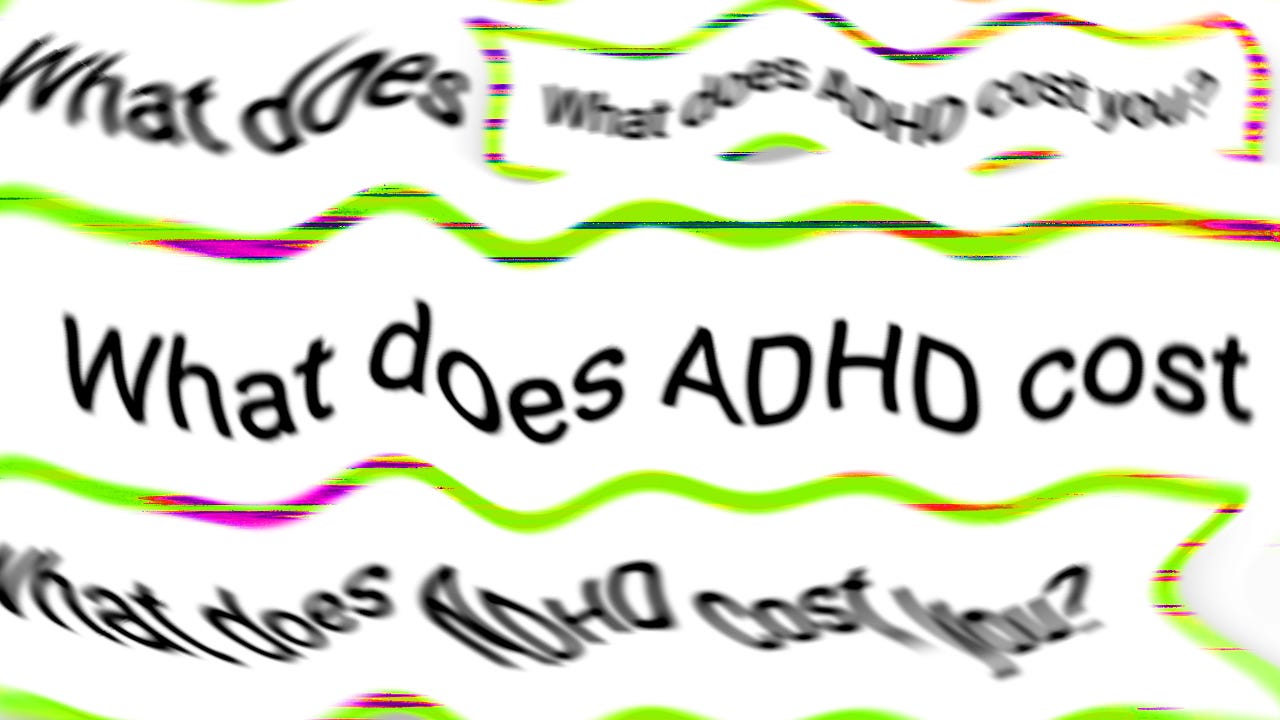The False Consciousness of ADHD
Hear me out! PLUS: internalizing spreadsheets, a selection of Youtubes, and experiments in trash gardening
In a piece that’s very much giving stop buying avocado toast, Buzzfeed asks a financial planner for advice on how to get out of debt when you have ADHD.
Debt is framed simply as a result of “impulse spending”, and capital management expert Daniel DeWitt’s tips include things we’ve all been told a thousand times, like not using credit cards, cancelling subscriptions, and cutting back on that pesky expense, food:
“food is the Number 1 biggest problem” because delivery apps have made it so easy to order takeout. DeWitt said, “So many people have told me that after several months of not spending $200 a week on DoorDash that they don’t miss it.”
This is pretty obvious advice, but it misunderstands a lot. Meal planning, grocery shopping, and cooking are difficult feats for workers who have to sell their time for wages, not to mention the classically frugal “cook at home” advice barely applies anymore with grocery inflation.
Food monopolies like Cargill and PepsiCo are raking in record profits while families struggle to afford basics like eggs and bread, and executives are bragging about it on their earnings calls. Credit card debt, too, which the article spends much of its word count discussing, is not a personal failure — it’s the basis of our modern economic system.
Wages have stagnated since the 1970’s, and instead of raising them, credit was made more available to workers, giving them buying power when they had none. Banks literally mailed millions of credit cards to Americans in the late 60’s without even checking if they had income — some of them were addressed to infants!
Economist Richard D. Wolff explains:
“We now have a society in which the mass of people have to borrow to have a home — mortgage — have to borrow to have a car — automobile loans — have to borrow for daily expenses — credit cards — and have to borrow for putting their children through college…so everything is now completely locked into a total system of debt. It is a way of controlling people.”
You can’t quit your job if you have debts to pay! Marx called credit “the most potent means of driving capitalist production beyond its own limits,” and this is true for our limits, too. Interest-free buy now, pay later schemes from companies like Afterpay and Klarna have replaced the free credit card in the mail for Gen Z, and student debt is now a mandatory rite of passage.
James Davies writes that student debt is a “potent form of socialisation into neoliberalism” because it forces young people to factor repayment into the rest of their lives, making them “more likely to become fiscally conservative” — more likely to seek out the services of a financial planner like Daniel DeWitt.
On DeWitt’s website, a page full of fake client success stories features smiling, happy white people with good jobs like therapist and “equity-compensated tech director”, their respective ADHD types noted in their bios. A button in the top corner asks: What Does ADHD Cost You?
This leads to a questionnaire asking the visitor to estimate money spent monthly on food delivery, impulsive spending, and the “ADHD tax”, a term for late fees and forgotten parking tickets. (The site refers to this as “the extra money you pay because of your ADHD” and not, as I would say, “the extra money you pay because late fees are a predatory part of business models.”)
The site adds up all the estimates into a lump sum that we could be saving every year for an “emergency fund” or a “dream vacation” (“Suddenly, you have more control!”) before offering the low, low price of $200 per month to work with a “fellow ADHDer” who can teach us “ADHD-specific strategies” for managing our money.
It’s a classic American message of personal responsibility filtered through a diagnostic lens, the solution to economic hardship presented as learning better “self-management” skills to generate more wealth. I can’t help but think about the idea of false consciousness here — those structures or ideas that hide the real nature of a capitalist economy.
In this case, it’s the idea that a brain disorder is the cause of your money problems. The DSM is being used to obscure the real cause of economic hardship: exploitation.
Sociologist Vivek Chibber explains:
“Workers become more amenable to ideology in situations where they are powerless to change or improve their structural situation. But in conditions where workers are able to collectively organize, where they’re able to overcome all the obstacles to collective action, in those situations, ruling class ideology obviously becomes far less effective.”
This makes a lot of sense when you consider that union membership has been in decline over the last few decades, coinciding with the expansion of ADHD diagnoses to adults in 1980. Bruce M. Z. Cohen writes:
“Following the construction of DSM-III, a number of mental illness classifications have appeared which have specifically sought to pathologise behaviour and personality traits which are seen to limit the desired skills and roles of workers in the neoliberal workplace”
Svend Brinkman has described diagnoses as “anchors” in a modern world that is constantly shifting and accelerating. They can be a kind of answer (see: the rock bottom to “it finally all makes sense!” trope in diagnosis stories), but they can also take all the politics out of our pain.
A biomedical view of ADHD explains economic hardship with a detached neurological lens that seems to exist somewhere outside of history. But debt isn’t caused by Bad With Money Disorder — it’s a tool of class warfare, and ADHD or not, we’re all being targeted.
Extras for paid subscribers this week:
notes from Saving Time by Jenny O’Dell
a couple of YouTube’s finest videos
my embrace of trash gardening




